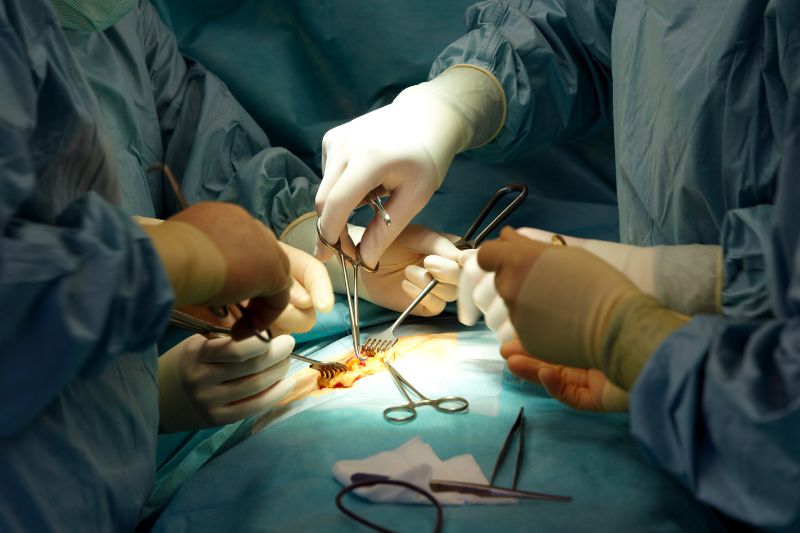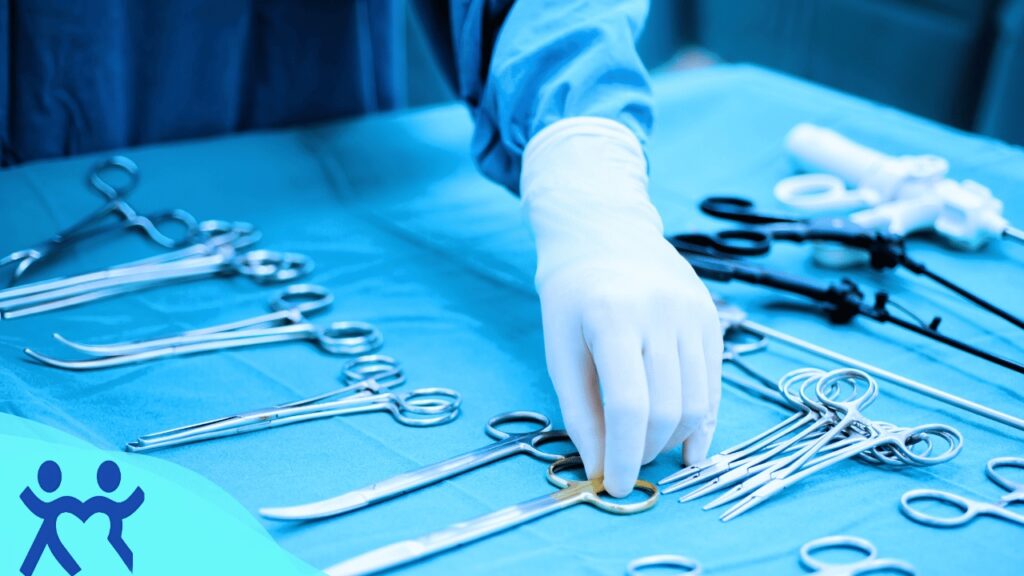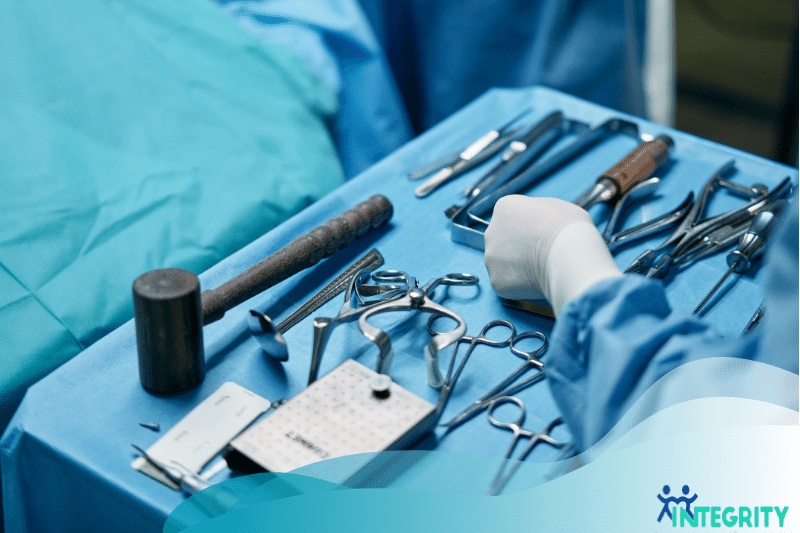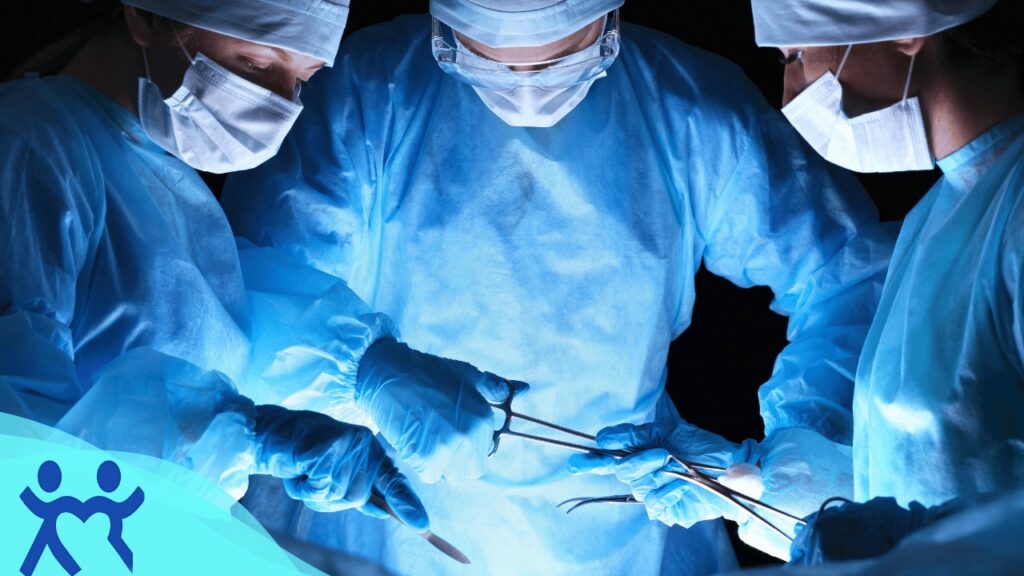
A common modern medical procedure in Nagpur is laparoscopy surgery, sometimes referred to as minimally invasive surgery. It involves making small incisions in the abdomen to insert a laparoscope—a thin tube with a camera and light—to visualize the inside of the body. This technique is widely used for diagnosing and treating various abdominal conditions.

Benefits of Laparoscopy Surgery in Nagpur
- Minimally Invasive: Unlike traditional open surgery, laparoscopy surgery in Nagpur requires smaller incisions, resulting in less pain, faster recovery, and minimal scarring.
- Shorter Hospital Stay: Patients undergoing laparoscopy surgery in Nagpur often experience shorter hospital stays compared to traditional surgery, allowing them to return to their daily activities sooner.
- Reduced Risk of Complications: With smaller incisions and less tissue trauma, laparoscopy surgery in Nagpur reduces the risk of complications such as infection and blood loss.
- Better Visualization: The laparoscope provides surgeons in Nagpur with a clear and magnified view of the abdominal organs, allowing for more precise surgical interventions.
Conditions Treated with Laparoscopy Surgery in Nagpur
- Gallbladder Stones: Laparoscopy surgery in Nagpur is commonly performed to remove gallstones and the gallbladder itself, known as laparoscopic cholecystectomy.
- Appendicitis: In cases of appendicitis, laparoscopy surgery in Nagpur offers a minimally invasive approach for removing the inflamed appendix, known as laparoscopic appendectomy.
- Hernia Repair: Hernias such as inguinal and umbilical hernias can be repaired using laparoscopy surgery in Nagpur, offering faster recovery and reduced post-operative pain.
- Gynecological Conditions: Laparoscopy surgery in Nagpur is used to diagnose and treat various gynecological conditions such as endometriosis, ovarian cysts, and ectopic pregnancies.
- Digestive Disorders: Conditions like gastroesophageal reflux disease (GERD) and hiatal hernias can be treated with laparoscopy surgery in Nagpur, offering relief from symptoms such as heartburn and difficulty swallowing.
The Laparoscopy Surgery Process in Nagpur
- Preparation: Before laparoscopy surgery in Nagpur, patients may be asked to fast for several hours and undergo pre-operative tests to ensure they are fit for surgery.
- Anesthesia: During the procedure, patients in Nagpur are given general anesthesia to ensure they are unconscious and pain-free.
- Incision: Small incisions, usually less than an inch long, are made in the abdomen to insert the laparoscope and surgical instruments.
- Visualization: The laparoscope provides a magnified view of the abdominal organs on a monitor, allowing surgeons in Nagpur to perform the surgery with precision.
- Surgical Intervention: Using specialized instruments, surgeons perform the necessary procedures, such as removing diseased organs or repairing hernias.
- Closure: After completing the surgery, incisions are closed with stitches or surgical tape, and dressings may be applied.

Recovery from Laparoscopy Surgery in Nagpur
- Hospital Stay: Most patients undergoing laparoscopy surgery in Nagpur can expect to stay in the hospital for a day or two, depending on the complexity of the procedure.
- Pain Management: Patients may experience mild discomfort or soreness at the incision sites, which can be managed with pain medications prescribed by doctors in Nagpur.
- Activity Restrictions: While recovery time varies depending on the type of surgery, patients are usually advised to avoid strenuous activities for a few weeks and gradually resume normal activities.
- Follow-up Care: Doctors in Nagpur will schedule follow-up appointments to monitor healing progress and address any concerns or complications that may arise.
Choosing the Right Surgeon for Laparoscopy Surgery in Nagpur
When considering laparoscopy surgery in Nagpur, it’s essential to choose a skilled and experienced surgeon who specializes in minimally invasive techniques. Patients should research surgeons’ qualifications, experience, and success rates before making a decision. Additionally, seeking recommendations from healthcare professionals or trusted sources can help patients find the right surgeon for their needs.
Understanding Laparoscopy Surgery in Nagpur
Laparoscopy surgery, known for its minimally invasive approach, has become a preferred option for various abdominal procedures. This modern technique involves making small incisions in the abdomen, through which a laparoscope—a thin tube equipped with a camera and light—is inserted to visualize internal organs. The benefits of laparoscopy over traditional open surgery are evident in terms of reduced pain, faster recovery, and minimal scarring.
Advantages of Laparoscopy Surgery
The advantages of laparoscopy surgery extend beyond its minimally invasive nature. Patients undergoing laparoscopy typically experience shorter hospital stays, reduced risk of complications, and improved visualization of the surgical site. These benefits contribute to a smoother recovery process and enhanced post-operative outcomes.

Conditions Treated
Laparoscopy surgery is utilized for a range of abdominal conditions, including gallbladder stones, appendicitis, hernia repair, gynecological issues, and digestive disorders. Whether it’s removing gallstones, repairing hernias, or addressing gynecological concerns like endometriosis, laparoscopy offers a versatile solution for various medical needs.
The Surgical Process
The laparoscopy surgical process involves several key steps. Patients are prepared for surgery with pre-operative tests and anesthesia is administered to ensure comfort throughout the procedure. Small incisions are made, allowing the laparoscope and surgical instruments to be inserted. Surgeons then visualize the abdominal organs on a monitor and perform the necessary procedures with precision. Afterward, incisions are closed, and patients are monitored closely during the recovery period.
Recovery Expectations
Recovery from laparoscopy surgery varies depending on the complexity of the procedure. Most patients can expect a short hospital stay, followed by a period of rest at home. Pain management techniques are employed to address any discomfort, and patients are advised to gradually resume normal activities under medical supervision. Follow-up appointments are scheduled to monitor healing progress and address any concerns that may arise.
Selecting a Surgeon
Choosing the right surgeon for laparoscopy surgery is crucial for successful outcomes. Patients should seek out surgeons with expertise and experience in minimally invasive techniques. Researching surgeons’ qualifications and success rates, as well as seeking recommendations from healthcare professionals, can help patients make informed decisions about their care.

Exploring Laparoscopy Surgery: A Modern Approach to Abdominal Procedures
Laparoscopy surgery has revolutionized the field of abdominal surgery with its minimally invasive techniques. Unlike traditional open surgery, laparoscopy involves making small incisions in the abdomen, through which a laparoscope—a slender tube equipped with a camera and light—is inserted to provide visual access to the internal organs. This approach offers numerous advantages, including reduced pain, quicker recovery, and less scarring.
Advantages of Laparoscopy Surgery
The benefits of laparoscopy surgery extend far beyond its minimally invasive nature. Patients undergoing laparoscopy typically experience shorter hospital stays, decreased risk of complications, and improved visualization of the surgical site. These advantages contribute to a smoother recovery process and better post-operative outcomes for patients.
Conditions Treated with Laparoscopy
Laparoscopy surgery is employed in the treatment of various abdominal conditions. From removing gallstones and addressing appendicitis to repairing hernias and managing gynecological issues like endometriosis, laparoscopy offers a versatile solution for a wide range of medical needs. Its precision and effectiveness make it a preferred choice for surgeons and patients alike.
The Surgical Process
The laparoscopy surgical procedure follows a systematic approach. Patients are prepared for surgery with pre-operative tests, and anesthesia is administered to ensure comfort during the procedure. Small incisions are then made, allowing the laparoscope and surgical instruments to be inserted. Surgeons use the magnified view provided by the laparoscope to perform the necessary procedures with accuracy. Once the surgery is complete, the incisions are closed, and patients are closely monitored during the recovery period.
Recovery Expectations
Recovery from laparoscopy surgery varies depending on the complexity of the procedure and the individual patient. Most patients can expect a relatively short hospital stay, followed by a period of rest at home. Pain management techniques are utilized to alleviate any discomfort, and patients are encouraged to gradually resume normal activities under medical supervision. Appointments for follow-up are made in order to track development and handle any issues that could come up throughout the healing process.

Selecting a Surgeon
Choosing the right surgeon is paramount for successful laparoscopy surgery outcomes. Patients should seek out surgeons who specialize in minimally invasive techniques and have a track record of successful surgeries. Researching surgeons’ qualifications, experience, and patient reviews can help patients make informed decisions about their care. Seeking recommendations from healthcare professionals can also provide valuable insight into selecting the right surgeon for their specific needs.
Advancements in Laparoscopy Surgery
As technology continues to evolve, so too does laparoscopy surgery. Recent advancements in imaging technology, such as high-definition cameras and 3D visualization systems, have further enhanced the precision and accuracy of laparoscopic procedures. These advancements provide surgeons with an even clearer view of the surgical site, allowing for more intricate and delicate procedures to be performed with greater confidence.
Advancements like high-definition imaging and robotic assistance are enhancing laparoscopy surgery. Specialized procedures across medical fields benefit from these innovations. Outpatient options offer convenience. Future trends include virtual reality and artificial intelligence, promising even greater precision and patient outcomes. Patient education is key for informed decision-making.
Specialized Laparoscopic Procedures
In addition to its traditional applications, laparoscopy surgery has expanded to include specialized procedures across various medical specialties. For example, in urology, laparoscopy is used for procedures such as nephrectomy (removal of the kidney) and prostatectomy (removal of the prostate gland). In bariatric surgery, laparoscopy techniques are employed for gastric bypass and sleeve gastrectomy procedures to aid in weight loss. These specialized applications highlight the versatility and adaptability of laparoscopy surgery across different medical fields.
Robotic-Assisted Laparoscopy
Another significant advancement in laparoscopy surgery is the integration of robotic technology. Robotic-assisted laparoscopy combines the precision of robotic systems with the benefits of minimally invasive surgery, allowing for even greater accuracy and dexterity during procedures. Surgeons control robotic arms equipped with surgical instruments, enabling them to perform complex maneuvers with enhanced precision. Robotic-assisted laparoscopy is particularly beneficial for procedures requiring fine motor skills and delicate tissue manipulation.

Outpatient Laparoscopy
With advancements in surgical techniques and anesthesia, many laparoscopy procedures can now be performed on an outpatient basis. Outpatient laparoscopy offers patients the convenience of undergoing surgery without the need for an overnight hospital stay. This approach is particularly advantageous for minor procedures and allows patients to return home on the same day, minimizing disruption to their daily lives.
Future Directions
Looking ahead, the future of laparoscopy surgery holds exciting possibilities. Emerging technologies such as virtual reality (VR) and augmented reality (AR) are being explored to further enhance surgical visualization and training. VR and AR systems could provide surgeons with immersive, three-dimensional views of the surgical site, allowing for enhanced spatial awareness and precision during procedures. Additionally, advancements in robotics and artificial intelligence (AI) are expected to further automate and optimize surgical techniques, leading to even better patient outcomes.
Challenges and Considerations
While laparoscopy surgery offers numerous benefits, it is not without its challenges and considerations. Some procedures may not be suitable for laparoscopic approaches due to factors such as patient anatomy or the complexity of the condition. Additionally, there may be a learning curve for surgeons transitioning to laparoscopic techniques, requiring specialized training and experience to achieve proficiency. Furthermore, the cost of laparoscopy surgery, particularly for robotic-assisted procedures, may be higher than traditional open surgery in some cases.
Patient Education and Empowerment
In conclusion, patient education and empowerment play a crucial role in the success of laparoscopy surgery. By understanding the benefits, risks, and considerations associated with laparoscopic procedures, patients can make informed decisions about their healthcare. Open communication between patients and healthcare providers is essential for addressing any questions or concerns and ensuring that patients feel confident and supported throughout the surgical process.
Closing Thoughts
Laparoscopy surgery continues to be at the forefront of modern medicine, offering patients a safer, less invasive alternative to traditional open surgery. With ongoing advancements in technology and techniques, laparoscopy surgery is poised to further improve patient outcomes and expand its applications across a wide range of medical specialties. By embracing innovation and collaboration, the future of laparoscopy surgery looks bright, promising enhanced precision, efficiency, and effectiveness in patient care.
Conclusion
Laparoscopy surgery in Nagpur offers numerous benefits over traditional open surgery, including smaller incisions, faster recovery, and reduced risk of complications. This minimally invasive technique is widely used to diagnose and treat various abdominal conditions, providing patients with effective solutions and improved quality of life. By understanding the laparoscopy surgery process, recovery expectations, and selecting the right surgeon, patients in Nagpur can undergo safe and successful procedures to address their healthcare needs.


